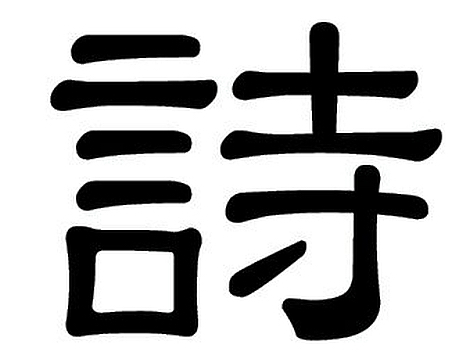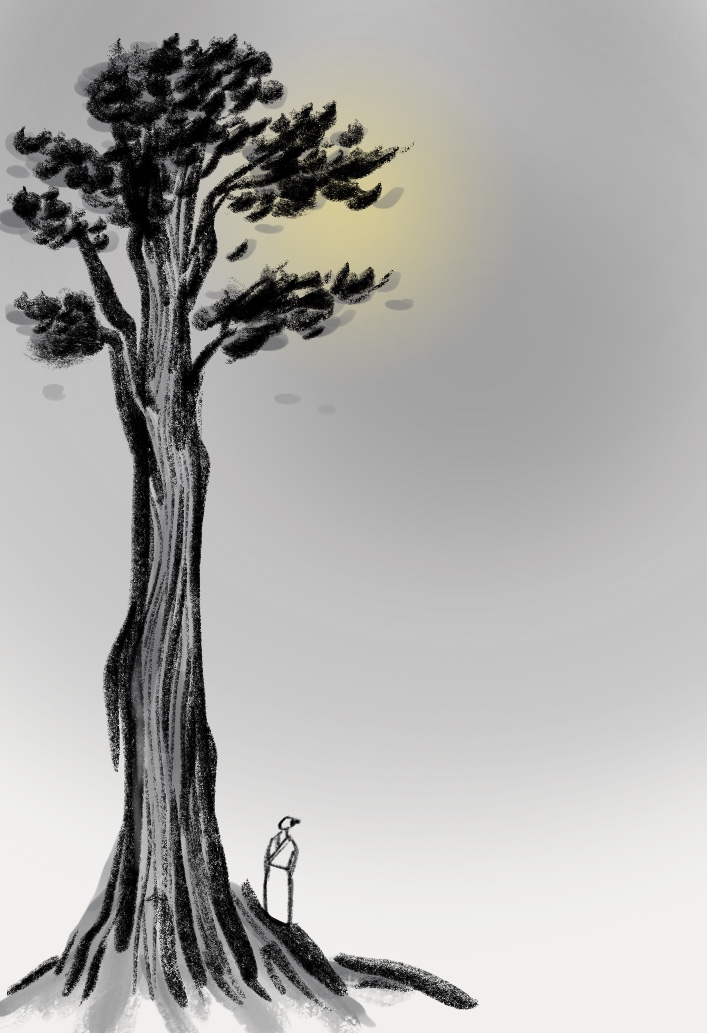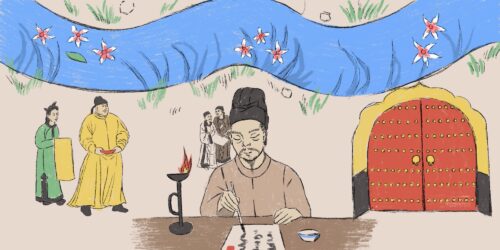Du Fu’s ‘Ballad of an Old Cypress’

April is National Poetry Month, and we’re celebrating with a series of articles that looks at Chinese poetry, both past and present. Our last piece was about the modern poet Hai Zi, who produced mystic, unforgettable works in his short life. Today we look at one of ancient China’s most famous poets, Du Fu.
(Illustration by Frankie Huang)

《古柏行》gǔ bǎi xíng
孔明庙前有老柏,柯如青铜根如石。
霜皮溜雨四十围,黛色参天二千尺。
君臣已与时际会,树木犹为人爱惜。
云来气接巫峡长,月出寒通雪山白。
忆昨路绕锦亭东,先主武侯同閟宫。
崔嵬枝干郊原古,窈窕丹青户牖空。
落落盘踞虽得地,冥冥孤高多烈风。
扶持自是神明力,正直原因造化功。
大厦如倾要梁栋,万牛回首丘山重。
不露文章世已惊,未辞剪伐谁能送。
苦心岂免容蝼蚁,香叶终经宿鸾凤。
志士幽人莫怨嗟,古来材大难为用。
Kǒngmíng miào qián yǒu lǎo bǎi, kē rú qīngtóng gēn rú shí.
Shuāng pí liū yǔ sìshí wéi, dài sè cāntiān èrqiān chǐ.
Jūnchén yǐ yǔ shí jìhuì, shùmù yóu wéi rén àixī.
Yún lái qì jiē wū xiá cháng, yuè chū hán tōng xuěshān bái.
Yì zuó lù rào jǐn tíng dōng, xiānzhǔ wǔhóu tóng bì gōng.
Cuīwéi zhī gàn jiāo yuán gǔ, yǎotiǎo dānqīng hùyǒu kōng.
Luòluò pánjù suī dé de, míng míng gūgāo duō lièfēng.
Fúchí zì shì shénmíng lì, zhèngzhí yuányīn zàohuà gōng.
Dàshà rú qīng yào liáng dòng, wàn niú huíshǒu qiūshān chóng.
Bù lòu wénzhāng shì yǐ jīng, wèi cí jiǎn fá shéi néng sòng.
Kǔxīn qǐ miǎn róng lóuyǐ, xiāng yè zhōng jīng sù luánfèng.
Zhìshì yōurén mò yuànjiē, gǔlái cái dà nàn wèi yòng.
Ballad of an Old Cypress
In front of the shrine of Zhu-ge Liang
there was an aging cypress,
its boughs were like green bronze,
its roots were like the stone.
Its frosted bark was streaked by rains
forty armspans round,
dark arch of mascara touching sky
two thousand feet above.
Already the minister and his lord
have met their moment,
yet still is this tree
cherished by men.
When clouds come, its vapors touch
the full length of Wu Gorges;
as the moon appears, its chill reaches
the white of the Mountains of Snow.
I think back now where the road wound
east of Brocade Pavilion,
where the Ruler of Shu and his Warrior Count
share a common shrine.
Trunk and branches loomed high there,
ancient upon the meadows,
with paintings dark and hidden away
through the empty doors and windows.
Spreading wide, roots coiled and clasped –
but though it found firm place,
high and alone in the black of sky
there are many violent storms.
Surely that which holds it up
is the might of some bright god;
its upright straightness is finally due
to the deed of the Fashioner.
If some great mansion should collapse
and they needed rafters and beams,
ten thousand oxen would turn their heads
at its weight, which is a mountain’s.
Even before it shows its grain,
all the world is amazed;
it would not object to being cut,
but who would be able to send it?
Its bitter core cannot keep out
intrusions of termites,
yet its fragrant leaves have ever given
night’s lodging to the phoenix.
Let neither sigh — not the man of grand aims
nor the man who lives hidden away —
it has always been true that the greatest timber
is hardest to put to use.
—Translation by Stephen Owen

Written in the wake of great political turmoil, Du Fu’s famous “Ballad of an Old Cypress” both celebrates and laments the eponymous cypress, great but ultimately unused. Shortly after the An Lushan Rebellion (755-763), Du Fu 杜甫 ended up seeking refuge in Kuizhou 夔州 (modern-day Chongqing). With the Tang’s fate in question and his health already failing, he was unable to fulfill his aspirations of serving the nation as an official, and in his poetry, he turned his attentions to southern heroes of the past with similarly frustrated aims.
“Ballad of an Old Cypress” begins with a commemorative cypress planted in front of famed strategist Zhuge Liang’s shrine. But Du Fu writes about not one but several trees that seem to map onto each other: the cypress in front of him in Kuizhou (Chongqing), the remembered cypress in front of Zhuge Liang’s shrine in Chengdu, and finally, the tree as a metaphor for a man of talent. Just as the timber — or 材 cái — of a tree can be used in the building of a house, one’s talent — 才, also cái — can be put to use in public service…but only if its value is fully recognized. In Du Fu’s case, the ruler did not recognize his talent. Perhaps he sees some of himself in the old tree.
But the remembered tree is recognized as extraordinary. It is impossibly huge and “cherished by men” long after Zhuge Liang, celebrated strategist for Liu Bei, has passed away. In a beautiful, timeless moment in the poem that joins the present with the past, the chill of the moon opens up — 通 tōng — a path from Kuizhou (in the Three Gorges area) to the “Mountains of Snow” of Chengdu, the “Brocade Pavilion.” And then, again, before the poet’s eyes is seemingly the same cypress:
When clouds come, its vapors touch
the full length of Wu Gorges;
as the moon appears, its chill reaches
the white of the Mountains of Snow.
I think back now where the road wound
east of Brocade Pavilion,
where the Ruler of Shu and his Warrior Count
share a common shrine.
Its immense weight is easily imagined, which brings to mind Sima Qian’s well-known line that some people’s deaths are as weighty (significant) as Mt. Tai, and some as light as a feather. Its ability to hold itself upright in spite of fierce storms is described as 神明力 (shénmíng lì), which can be read as a divine might but perhaps also a divine clarity of vision — an ambiguity that I think speaks to the way the literal tree stands in for the talented person. Without even revealing its 文章 (wénzhāng), translated by Owen as “grain” but also referring to written works, “all the world is amazed.”
Herein lies the tragedy. People recognize how remarkable the tree is, and yet, as Du Fu asks, “Who would be able to send it?” Who would be able to move this heavy timber before its time runs out? Could anyone even protect it? Not unlike Shel Silverstein’s Giving Tree, the tree is very much loved and yet slowly dying. Aging and exposed to the elements, its usefulness is dwindling.
What is its use, after all, casting its shadow on a shrine, literally overshadowing a memorial for a great hero? The way Du Fu and others focus their attention on the trees and not the shrine seems to highlight an irony: here was a great talent — Zhuge Liang — who is being neglected. No one seems to visit the Zhuge Liang shrine in Chengdu, its commemorative paintings “dark and hidden away / through the empty doors and windows.”
The last couplet is a consolatory statement, but an empty one. For the poem already seems to be a lamenting “sigh” — for the two cypresses, for the legacy of Zhuge Liang, and for Du Fu himself, the ailing poet in southern exile who wished, in vain, to serve his country.
We’re celebrating National Poetry Month by looking at Chinese poetry, past and present. Follow our series here.





